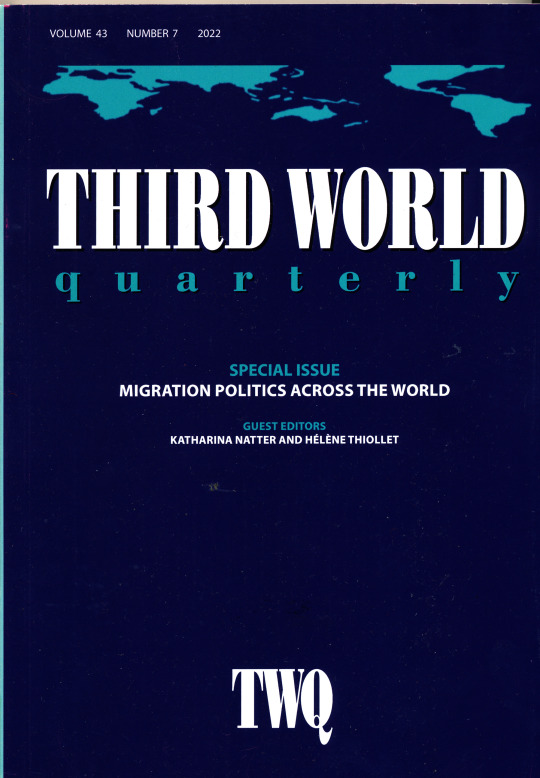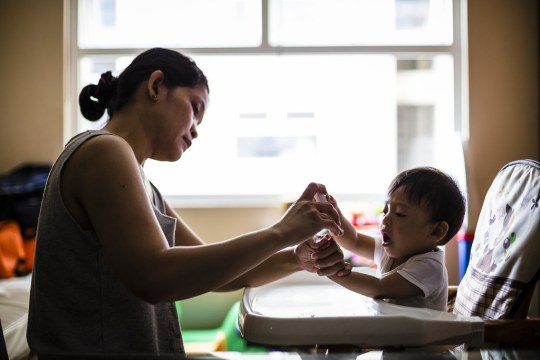#domestic work
Text
tumblr: your boss is not your friend! they shouldn't be making you do emotional labor! work-life balance! do only what they pay you for and then check out! [to be clear, I agree with this sentiment]
also tumblr: omg why is this literary protagonist saying she's LONELY when there are SERVANTS ALL AROUND HER?! what a SNOB she is to not BEFRIEND THEM AND TELL THEM ALL HER TROUBLES!!!
#tell me you're not seeing it from the workers' perspective without telling me...#history#historical fiction#domestic work#domestic workers
2K notes
·
View notes
Text

natasha trethewey domestic work: "housekeeping"
kofi
134 notes
·
View notes
Link
President Joko Widodo said his administration is keen on passing into law a bill that would finally protect the rights of some of the most exploited and abused people in Indonesia.
During a press conference at the Presidential Palace in Jakarta yesterday, Jokowi noted that the country’s Manpower Law does not regulate the employment of domestic workers, opening them up to risks of being subjected to inhumane working conditions, hours, and pay.
“In practice, domestic workers are susceptible to being robbed of their rights. So I think it’s time we have UU PPRT (Law on the Protection of Domestic Workers),” the president said.
The bill, known as RUU PPRT for short, has been dormant in parliament for 19 years, Jokowi said, and that it has been flagged as a priority bill for deliberation and ratification by the House of Parliament (DPR) this year in order to provide legal clarity for the 4.2 million domestic workers in Indonesia.
“I have instructed the Ministry of Justice and Human Rights and the Ministry of Manpower to coordinate efforts with DPR,” he said.
Based on a copy of the draft for RUU PRPT that has been circulating online, if ratified, the law will regulate domestic workers’ working hours, pay, and entitle them to leave and social security, among other things.
DPR says RUU PPRT will be discussed at a plenary session next week ahead of its expected swift passage.
Domestic work, live-in or otherwise, is considered an informal form of employment as workers are often hired without a contract. Domestic workers who find work through agencies are still susceptible to exploitation, as the only existing set of regulations for domestic work passed by the Ministry of Manpower in 2015 carries little to no legal weight for enforcement.
In addition to abuse, many Indonesian domestic workers face dehumanizing treatment by their employers on a daily basis, such as only being fed leftovers, not being allowed to eat in the presence of their employers, and being deprived of any recreational activities — all things that normalize the discriminatory idea that they are second-class citizens.
38 notes
·
View notes
Text

Cordelia Fine. Delusions of Gender: How Our Minds, Society, and Neurosexism Create Difference. 2010
2 notes
·
View notes
Text


#colorism#anti blackness#cuba#domestic work#cuban revolution#Anasa Hicks#black women historian#black women authors
29 notes
·
View notes
Text

#nowyouseeus#greatreads#booktok#book recs 2023#bookworm#booklover#singapore#phillipines#domestic work#domestic workers#crazy rich asians#social justice
3 notes
·
View notes
Text
Out now: Special Issues on #Migration Politics across the World / Regions in Global Migration Governance
Out now: Special Issues on #Migration Politics across the World / Regions in Global Migration Governance
A new Special Issue on The Politics of Migration Policies has been published in Third World Quarterly, guest edited by Katharina Natter and Hélène Thiollet. And Sandra Lavenex and Nicola Piper have guest edited a SI in the Journal of Ethnic and Migration Studies on “Regions in Global Migration Governance”. I had the pleasure to contribute to both SIs; find more information on the content and…

View On WordPress
#ASEAN#Asia#civil society#development#domestic work#gfmd#global governance#human rights#Migrant worker#migration#NGO#Philippines#southeast asia#United Nations
2 notes
·
View notes
Text
Share the Care: Breaking the Gender Bias
Care work, whether paid or unpaid, is essential for all societies to function properly and is mostly seen as a woman’s responsibility. However, despite the impact of care work on our lives, it continues to be undervalued. This article hopes to shed light on the importance of sharing the care at home and beyond.
Unpaid Domestic and Care Work

Photo by J. Aliling for the ILO
“Care work is central to human and social wellbeing. It includes looking after children, the elderly, and those with physical and mental illnesses and disabilities, as well as daily domestic work like cooking, cleaning, washing, mending, and fetching water and firewood.” – Oxfam International
Sharing responsibilities in the home can bring us one step closer to stopping all forms of gender inequality. Various societal norms have reinforced the gender division of labor wherein women and girls are expected to do most of the domestic and care work at home, while men assume the role of being the primary breadwinners of the family. These gender norms have limited the opportunities that give women and girls a better quality of life as they spend more time taking care of responsibilities at home. This situation is even worse for women and girls who live in marginalized areas, where resources are much more limited.
According to the International Labour Organization, “...women perform 76.2 per cent of total hours of unpaid care work, more than three times as much as men” (2018). These statistics have increased drastically due to the COVID-19 pandemic, due to the government mandates and work-at-home setups. However, despite women and men spending more time at home, the former still do most of the domestic and care work. According to the 2021 National Household Care Survey, women have spent 13 hours a day on domestic and care work, while men have only spent 8 hours daily.
Valuing Domestic and Care Work
youtube
“To really value this work, it's important to appreciate its significance for any society or economy.” – UN Women expert, Shahra Razavi (2017)
In the video above, UN Women expert Shahra Razavi says that the value of unpaid care work done in Switzerland would rival the country's banking and insurance industries. Similarly, UN Women reported in 2016 that unpaid domestic and care work almost amounts to 10 to 39% of a country’s Gross Domestic Product (GDP). Despite these numbers pointing to a high economic value of unpaid domestic and care work, this invisible labor continues to be ignored. Notably, the value of care work should not be limited to its possible economic value.
Care work by women has been the backbone of many well-functioning societies and economies. However, care work continues to be undervalued and seen as solely a woman's job. In ending the gender norms that perpetuate such harmful stereotypes, we can begin at home by equally dividing household chores between our sons and daughters. Aside from teaching our sons the importance of care work, men also need to “...challenge traditional thinking and recognize their equal share of care and domestic work responsibilities at home” (Cabaces, 2021).
Sharing the Care Beyond the Home
“Care should not be considered only as a burden and this central activity for well-being should be redistributed between men and women, as well as between the family and the State: States’ failures to provide, regulate and fund domestic and care formal services increase the burden for communities, families and especially women.” – Gaëlle Ferrant, Luca Maria Pesando, and Keiko Nowacka (2014)
Beyond sharing the care at home, legislation and policies are also a must to further support the care economy. These institutional changes can range from maternity and paternity leaves and flexible working arrangements to better childcare and family services. These examples can help ensure a work-life balance for both parents.

Photo by Direct Media on Stock Snap
From teaching our sons to help at home to enacting laws to lessen the burden of care work on women and girls, we can turn a house into a home when we share the care.
References
Cabaces, R. (2021, July 1). When fathers care. ABS-CBN News. https://news.abs-cbn.com/blogs/opinions/07/01/21/domestic-work-oxfam-equality-home
Canadian Labour Congress. (2022, March 7). IWD 2022: Gender equality depends on a healthy care economy. https://canadianlabour.ca/iwd-2022-gender-equality-depends-on-a-healthy-care-economy/
Donner, F. (2020, February 12). The Household Work Men and Women Do, and Why. The New York Times. https://www.nytimes.com/2020/02/12/us/the-household-work-men-and-women-do-and-why.html
Ferrant, G., Pesando, L., & Nowacka, K. (2014, December). Unpaid Care Work: The missing link in the analysis of gender gaps in labour outcomes. OECD. https://www.oecd.org/dev/development-gender/Unpaid_care_work.pdf
International Labour Office, Addati, L., Cattaneo, U., Esquivel, V., & Valarino, I. (2018). Care work and care jobs for the future of decent work.
Miller, C. (2018, August 8). A ‘Generationally Perpetuated’ Pattern: Daughters Do More Chores. The New York Times. https://www.nytimes.com/2018/08/08/upshot/chores-girls-research-social-science.html
Oxfam International. (n.d.). Not all gaps are created equal: the true value of care work. https://www.oxfam.org/en/not-all-gaps-are-created-equal-true-value-care-work
Rodriguez, L. (2021, September 13). Unpaid Care Work: Everything You Need to Know. Global Citizen. https://www.globalcitizen.org/en/content/womens-unpaid-care-work-everything-to-know/
UN Women. (2017, March 3). What is the real value of unpaid work? [Video]. Youtube. https://youtu.be/fcqt0QzgUFU
UN Women. (2019, May 15). Gender equality starts at home: Seven tips for raising feminist kids. Medium. https://medium.com/we-the-peoples/gender-equality-starts-at-home-seven-tips-for-raising-feminist-kids-75e1bf00b863
UN Women. (n.d.). Redistribute unpaid work. https://www.unwomen.org/en/news/in-focus/csw61/redistribute-unpaid-work
3 notes
·
View notes
Text

Truck comes first and if there is any money left over the kids may eat. - Modern Consumer Patriarchy
#heterorealism#gender equality#men ain't shit#divorce him#feminism#wages for housework#domestic labor#working class women#blue collar women#fuck the patriarchy
38K notes
·
View notes
Text
Pigeon attempts to court falcon
#is the bird video cute? in my amateur opinion this is probably an unremarkable situation#domestic falcon waiting for work and domestic pigeon trying to fuck it#'that pigeon is huge' wrong. falcons generally arent much bigger than their prey#video#animals#birds#ship dynamic#safekeeping
95K notes
·
View notes
Text





i think they should take turns cuddling for healing purposes
#trigun#trigun maximum#trimax#vash the stampede#nicholas d. wolfwood#meryl stryfe#milly thompson#mashwood#merylvash#vashwood#merylwood#polygun if i dare say#trigun fanart#raepliica_art#i blast them with the domestication beam!!!!#they need to stick two beds together bc fluff bird vash takes up too much space#meryl so small she gets lost in the feathers#they would fight for their turn at cuddling the feathered otherworldly creature#and they'd just sit around waiting for milly to come back from her work trip like dogs waiting at the door#excuse the lack of plot; i didnt plan anything beyond page 2🧍#got possessed with wanting to draw mashwood again#and then merylwood specifically
6K notes
·
View notes
Text

got an ipad so i had to draw my son in his many positions of rest
#patches#domestic shorthair#digital art#things i make#catblr#i got an ipad last year but took it back because my wacom had started working#well between then and recently the wacom has made decisions to do all but work#making it where i would have to go deep into the guts of my computer to delete every associated file and reinstall the driver#just to get it to work. happened multiple times and support was like ‘weird. just use this old update indefinitely’ so like. that isnt ideal#so i got an ipad (again)
7K notes
·
View notes
Text
you love touching suguru. it doesn’t necessarily have to be sexual, but the feeling of his skin is so comforting. he pretends to be annoyed at the fact that you can never seem to leave his personal space when he comes back from the gym, drenched in sweat and groaning that he stinks and that you’ll get acne from pressing your face against his sweaty one.
“you’re my stinky,” you press your lips against his cheek and mumble the words that have him making a face. he gently pulls you away from him.
“as much as I appreciate being your stinky, I wanna be your mr clean.” he tosses his clothes in the laundry basket in the bathroom.
“oh my god, like the guy on the cleaning product?” you gasp excitedly, and suguru stares st you both confused and amused at how you’re also taking off your clothes to join him.
“huh?”
“yknow the guy with white hair and pale skin—not gojo, this one is like much older and he’s ripped—“ you show with your hands how big his muscles are, and you giggle when you see suguru flex his back muscles as he steps into the shower.
“sounds like you have the hots for this cleaning product guy.” he turns on the water and waits for you to join him so that you both get warm enough.
“I mean, they do call him daddy…I think?”
and that makes him spray you with cold water until you’re begging for forgiveness.
#moon's works#my babyyyyy myyyyy babyyyyyy#i love domesticity with him hehe#jujutsu kaisen#geto suguru#geto x reader#geto fluff#geto x reader fluff#jujutsu kaisen fluff
5K notes
·
View notes
Text

older wolfstar mess
#in my portrait study era ig#small brush from the last kierthur doodle rlly got me and its way less daunting to do close ups#plus and also i can work thru my heap of homoerotic reference pics#ive never rlly gotten to draw them grown and i do love these little guys#little wrinkles#marauders#wolfstar#sirius black#remus lupin#my art#mwpp era#the ref i worked from is of two guys in bed i cant find it anymore but yeah wolfstar in bed domestic
5K notes
·
View notes
Text
So I just finished reading a New York Times article on the division of household chores for a presentation I'm giving next week and it's actually eye opening. Despite young people's more open viewpoints on gender identity and women in the workforce, women nowadays are still doing the same percentage of domestic work as they were in the 70s; that is to say, most of it. The article references multiple studies done over the course of decades and despite slight shifts in childrearing responsibilities, things like cooking and cleaning are still widely delegated to women.
As a trans person (ftm) now living with three cis boys, this confirms everything I've been thinking for the last year. I've been doing 90% of the cleaning and maintaining of our dorm while they do... anything else. At first it was really bad; it was over a month since we moved in and everything was a mess. There were cockroaches living in the toilet (which was now brown), it looked like someone was practicing spit takes on the mirror to the point where you physically couldn't see yourself in it, and the shower walls were literally covered in brown slime. None of them even started a conversation about cleaning, much less actually did anything. So, every three weeks, I deep cleaned the whole dorm by myself. It was horrible. And they knew, they would literally step over me as I scrubbed their mess out of the floor for hours.
I implemented a chore wheel after that so they each got one chore every two weeks and I got the other seven, but they still often neglect to do them so I have to pick them up.
I have done a lot of angry thinking during the countless hours I've been scrubbing and sweeping and my thoughts kept coming back to gender. I was never forced to act excessively in line with gender roles by my parents or had a lot of chores at home, but I still felt like it was my obligation to keep things clean here. Maybe it was because the others weren't doing it, but why weren't they? Did they all feel like it wasn't their job to do? Were they all waiting for their mother (or someone akin to that) to come and clean up after them? Or maybe because I was raised in a household that was mostly women, my standards of cleanliness were higher than theirs and they were fine living like this?
I don't really have anywhere I'm going with this; I just think it's really interesting that despite more acceptance for women to deviate from the household sphere, they're still expected to do most of the cleaning. And how even though I've been presenting and living as a man for the last three years, I still accepted that traditionally female role instead of trying harder to get them to do it. Gender roles are a lot harder to escape than I thought.
#or maybe theyre just bad roommates lol They're all good guys but god... i can't wait to move out#i can also count on one hand the number of times they bought shared supplies like toilet paper and hand soap#and the times they called maintenance about urgent problems we had (repeating weeklong black outs/mold/rapid flooding/etc)#i have been doing both of those things as well#gender roles#new york times#transgender#gender#domestic work
1 note
·
View note
Text
International Women’s Day Marches | The Portugal News
“This strike is based on a very specific wave of feminism and on three main pillars: the labour strike, the student strike, but also the care strikes – which is, basically, the work that women do in society and without which society collapses”, Cheila Collaço Rodrigues, activist from the Lisbon branch of the March 8th Network “stressed,” according to TPN.
View On WordPress
0 notes